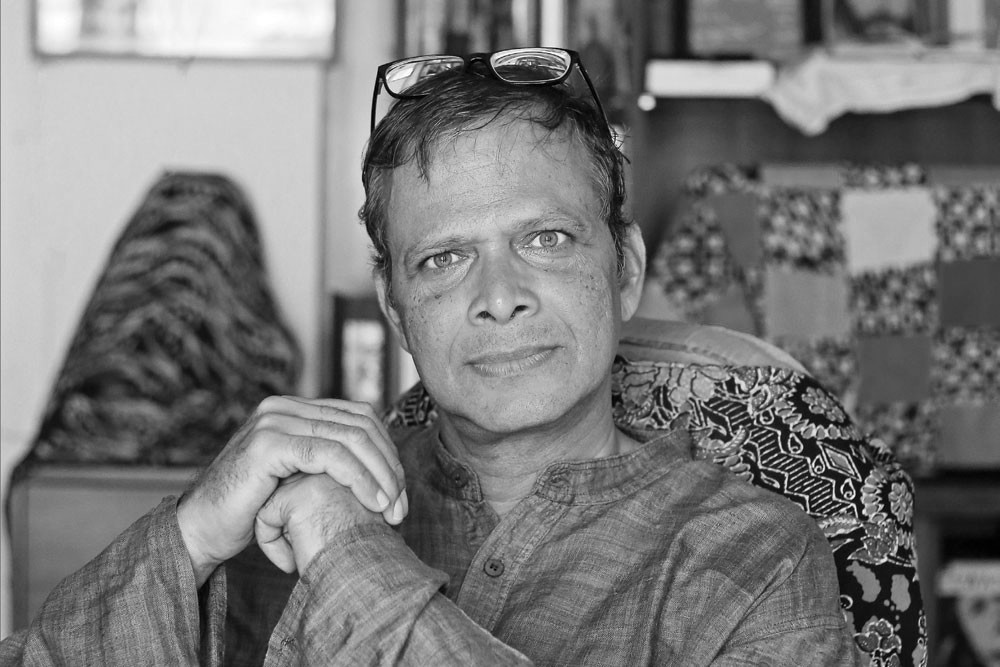
I must admit that I discovered the language Saint Tukaram spoke, Marathi, in the same breath that I found his poems – a robed form of Saint Tukaram first appeared to me on the cover of a book that was buried in the classics section at the hypermodern Lulu’s mall, in Kochi, India. I suppose this is not how many Indians encounter Tukaram, in the heady rush of travel, learning eons each day. A few weeks later, I happened to be visiting Kozhikode and was in town for the Kerala Literature Festival by chance. It was then that I realised that Jerry Pinto, Tukaram’s translator, would be speaking, and I was excited to attend his talk.
Jerry introduced Tukaram as his good friend, someone who he had been in a relationship with since memorising his abhenga (a form of devotional poetry) at school. The subject of literary translation does not immediately seem one that would inspire an abundance of passion, and yet here was Jerry, repeatedly standing up from his chair to speak directly to the audience. With pinpoint precision, he asked of us who had read their holy book in its original language, insisting on how fundamental translation is in the development of each of our spiritual lives.
Following this whim of fate, I asked Jerry if he’d be willing to partake in an interview for Cordite, and he was generous enough to meet me backstage within the hour. Below is a transcript of our exchange.
Lia Dewey Morgan: I thought I might start by asking you about how you arrived at working with English because in Australia it might not be understood the kind of role that English plays in Indian literature. So, if you wanted to speak about this, I’d be interested to know more.
Jerry Pinto: I live in a city that is constructed out of stories as all cities are. They’re just repositories of people’s stories; when people come to the city, they bring their stories with them, and they create new stories with each other. The thing about Mumbai or Bombay is that it is a multi-voiced and multilingual city. So, on the same floor that I lived, there was my family that came from Goa where the state language is Konkani, there was another family that spoke Marathi and another that spoke Gujarati. That’s three possible languages, and there were many other languages in the area.
When I went to school, the lingua franca in the playground was Hindi. English was not considered important, or even a language that counted for your success in the world. We were told repeatedly that if you were monolingual and only spoke English you would fail in life, you would never get a job in India. Apparently, the reverse is true now. English has become kind of a killer language. It is the language of political and economic power at any rate and being able to speak English is central to everybody’s aspirations as far as language goes.
As for why I began to work in English, that was the language that we spoke at home. My father grew up in Goa and my mother in Burma. When she came to Goa – the family was driven out of Rangoon by the arrival of the Japanese – Burmese was laughed out of her, and Konkani was laughed into her. My parents met in Bombay which was then part of British India. After they got married, the natural language of communication between them was English and that became the language in which the family communicated. My mother was a deep devotee of the English language, which she said also offered the kind of play that was possible in very few other languages. After she came to Bombay, English became, again, an aspirational thing, and she went to work with the American consulate, where the fact that she could write a very simple letter without Indian frills and fluttering was the reason why she got hired. In that sense, we grew up speaking English, but understanding Konkani and understanding Marathi and Hindi as well as a smattering of Gujarati – that was the language sphere. And I’m not making any special claims. This was how almost everybody lived their lives.
In Kozhikode, where we are right now, the language sphere would be English, Malayalam, Hindi, Tamil, maybe. In India, there are always a few languages that are interconnected and working together. I always say that we are an archipelago of languages, connected at low tide. When the tide runs low, you can cross between the islands of language. But you do it for your agenda, you do it for communication, to get certain jobs done, and then you rush back to your island. Translation or working with another language is, for me, the act of crossing to the other island but now the crossing is in the nature of a pilgrimage – you are going with a respectful intention of coming back with spiritual gain. And for me, all the translation that I’ve done – I think now it must be about 10 books – has been about deepening and enriching my experience of language. I am completely unfaithful to English. I am happy to disport in any language that will have me.













